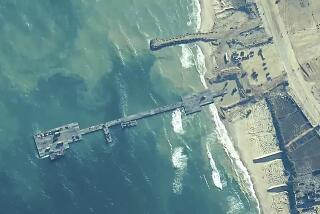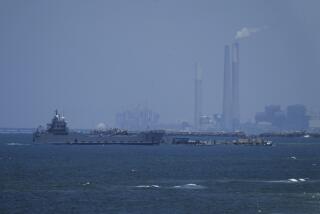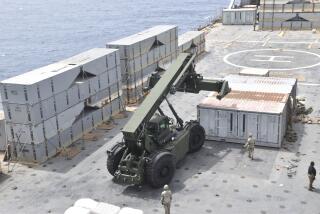Relief Teams Ready to Help Kuwaitis : Postwar aid: The U.N. meets today to coordinate efforts. A U.S. official says costs could exceed war expenditures.
WASHINGTON — International relief agencies have already begun sending humanitarian aid to Iraq, but similar assistance for war ravaged Kuwait will have to wait until disaster assessment teams are allowed into Kuwait city to begin surveying the damage.
Experts from the United Nations, the International Red Cross and the U.S. Agency for International Development have assembled in the Gulf and are waiting for permission to travel to Kuwait city.
“We have teams lined up, ready to go, as soon as we get clearance,” said Ann Stingel, a spokeswoman for the international activities department of the American Red Cross.
The need for emergency relief supplies--especially food, medicine and water purification equipment--is expected to be enormous, one expert said. He added that relief officials could not be more specific until they assess the damage in Kuwait city.
“For the past seven months, Kuwait has been a real dark hole. . . . We really have no idea of the situation there at the moment,” Stingel said.
Saudi Arabia has already pledged up to 10% of its domestic food stocks as emergency assistance for Kuwait.
And the U.S. Agency for International Development has put together contingency plans to construct temporary shelters, provide medical care and cope with immediate sanitation and public health problems, including the likelihood of epidemics.
“We’ve been preparing for this since day one of the war,” said Renee Bafalis, a U.S. AID spokeswoman. “We have contingency plans ranging from small operations to extremely large ones in place and, as soon as we get the word, we can respond within 24 hours.
“But until the assessment teams go in, which we hope will be this week, we won’t have any idea of what’s really needed,” Bafalis said.
Iraq, which barred relief teams from visiting Kuwait, has started to receive humanitarian assistance ahead of its newly liberated neighbor.
A joint team representing the World Health Organization and the United Nations Children’s Fund has just returned from Baghdad, where it distributed 54 tons of emergency health supplies brought in by trucks from Tehran.
In Geneva, International Red Cross officials announced that the organization will send three water purification units, each capable of distilling 21,000 gallons of water per day, to Baghdad where the supply system has broken down.
“There is a real danger of epidemics breaking out in Iraq and we assume the same is true in Kuwait, although we just don’t know at this point,” a senior UNICEF official said.
U.N. Secretary General Javier Perez de Cuellar has called a meeting of the heads of all major U.N. relief organizations today in New York to coordinate their efforts throughout the Gulf. U.S. AID officials said they would participate in those plans.
While the costs of the relief efforts are not yet known, Robert D. Reischauer, director of the Congressional Budget Office, said Wednesday that the costs of rebuilding Kuwait and keeping U.S. forces in the Persian Gulf could easily exceed those of the war.
He told a House Budget Committee hearing that the total cost of the war will probably not exceed $45 billion.
But that amount could well be dwarfed by the costs of keeping U.S. forces in the region over an extended period of time. Reconstruction aid for Kuwait and Iraq could also cost as much as $5 billion. “The costs of postwar policies represent the source of greatest uncertainty,” he said.
More to Read
Sign up for Essential California
The most important California stories and recommendations in your inbox every morning.
You may occasionally receive promotional content from the Los Angeles Times.










